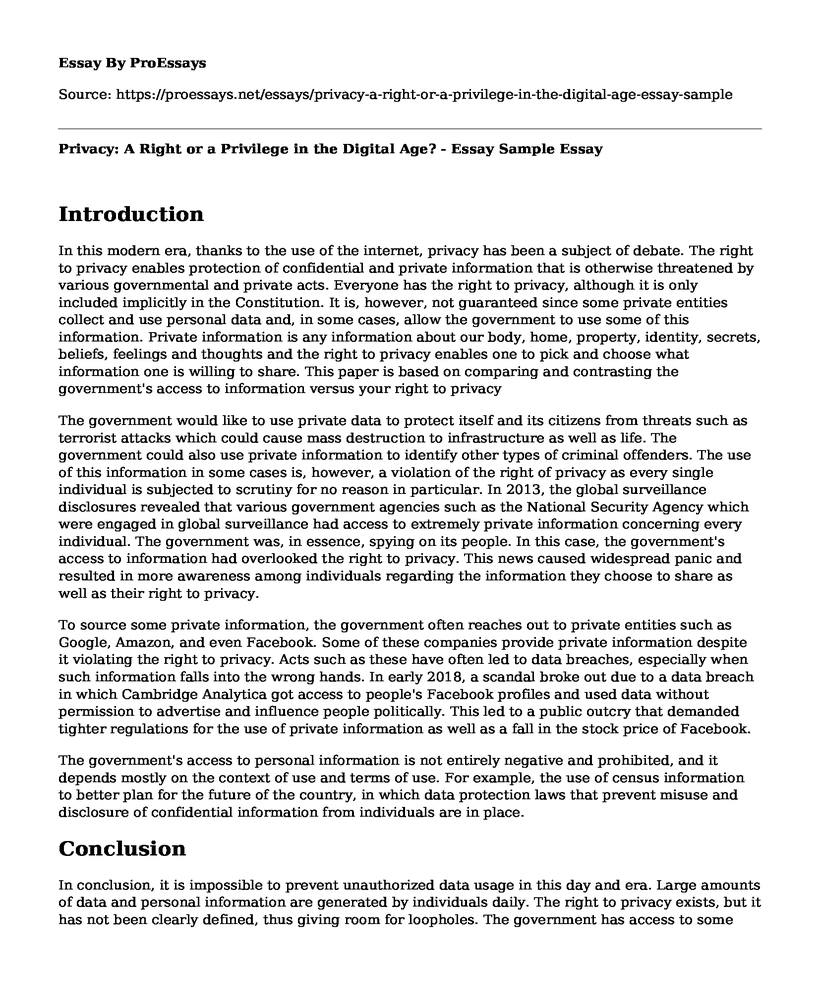Introduction
In this modern era, thanks to the use of the internet, privacy has been a subject of debate. The right to privacy enables protection of confidential and private information that is otherwise threatened by various governmental and private acts. Everyone has the right to privacy, although it is only included implicitly in the Constitution. It is, however, not guaranteed since some private entities collect and use personal data and, in some cases, allow the government to use some of this information. Private information is any information about our body, home, property, identity, secrets, beliefs, feelings and thoughts and the right to privacy enables one to pick and choose what information one is willing to share. This paper is based on comparing and contrasting the government's access to information versus your right to privacy
The government would like to use private data to protect itself and its citizens from threats such as terrorist attacks which could cause mass destruction to infrastructure as well as life. The government could also use private information to identify other types of criminal offenders. The use of this information in some cases is, however, a violation of the right of privacy as every single individual is subjected to scrutiny for no reason in particular. In 2013, the global surveillance disclosures revealed that various government agencies such as the National Security Agency which were engaged in global surveillance had access to extremely private information concerning every individual. The government was, in essence, spying on its people. In this case, the government's access to information had overlooked the right to privacy. This news caused widespread panic and resulted in more awareness among individuals regarding the information they choose to share as well as their right to privacy.
To source some private information, the government often reaches out to private entities such as Google, Amazon, and even Facebook. Some of these companies provide private information despite it violating the right to privacy. Acts such as these have often led to data breaches, especially when such information falls into the wrong hands. In early 2018, a scandal broke out due to a data breach in which Cambridge Analytica got access to people's Facebook profiles and used data without permission to advertise and influence people politically. This led to a public outcry that demanded tighter regulations for the use of private information as well as a fall in the stock price of Facebook.
The government's access to personal information is not entirely negative and prohibited, and it depends mostly on the context of use and terms of use. For example, the use of census information to better plan for the future of the country, in which data protection laws that prevent misuse and disclosure of confidential information from individuals are in place.
Conclusion
In conclusion, it is impossible to prevent unauthorized data usage in this day and era. Large amounts of data and personal information are generated by individuals daily. The right to privacy exists, but it has not been clearly defined, thus giving room for loopholes. The government has access to some personal information, and more laws should be put in place to govern its use.
Cite this page
Privacy: A Right or a Privilege in the Digital Age? - Essay Sample. (2023, Feb 15). Retrieved from https://proessays.net/essays/privacy-a-right-or-a-privilege-in-the-digital-age-essay-sample
If you are the original author of this essay and no longer wish to have it published on the ProEssays website, please click below to request its removal:
- Comprehensive Immigration Reform Law Essay
- An Analysis of Walt Disney's Social Performance: Environment and Human Rights
- False Confession by an Innocent Victim Essay Example
- Essay Sample on Trump`s Afghan Strategy
- Essay Sample on Human Rights Violations: A Global Malpractice in Health Care
- Essay on Airpower: Influencing Behaviors, National Security, War
- Free Report Sample on Criminal Intelligence Agency: Leveraging Math Models to Improve Decision-Making







